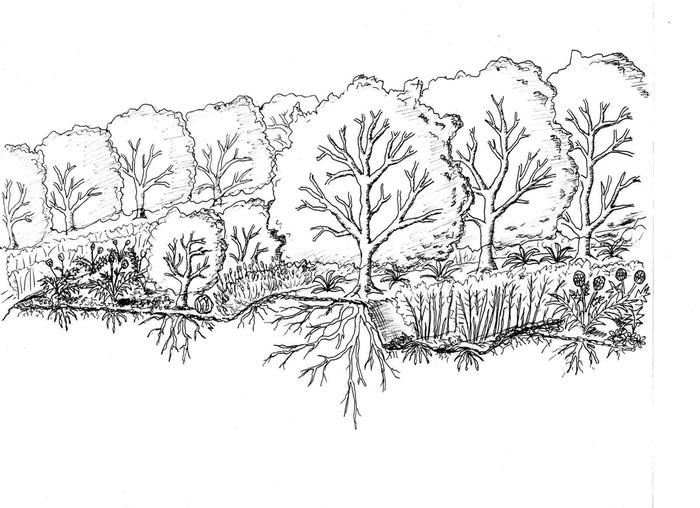posted 14 years ago
There's been a lot of discussion on here lately about whether some models of profit are better or worse or more sustainable than others with regard to permaculture. Specifically there is some doubt as to whether the teaching/tours/writing profit model (as practiced by the more famous permaculture folks) is sustainable and really permaculture or not. I was thinking about that and a little metaphor dawned on me that I thought was interesting, so I thought I'd share and find out what the rest of you think of it.
As far as almost everyone outside of this forum is concerned, permaculture is currently a fringe movement that they figure will rise and fall like many others have before. They look at our ideas with a certain amount of eye-rolling and head-shaking, if for no other reason than there are so many other examples of passion being confused with zealotry, and they usually pass without making much of a difference. As a result of that, there isn't much interest on a broad scale in paying extra for permaculture food products, which leads people on the forum here to wonder if permaculture is really not as profitable as it seems like it should be.
So here's the metaphor: succession. Right now, the market for permaculture products is a barren wasteland. It's soil that's been chemically farmed for 50 years and then abandoned. As a result, the only "permaculture plants" (i.e. businesses) that can survive are the hard core generalists that can do everything for themselves. The pioneer species. In order to succeed in this environment, you have to make your own fertility, so to speak, by developing your market in whatever way is possible. This is what I think is being done with the tours, book writing, lectures, classes, etc. The interest right now in permaculture is more of an intellectual curiosity for most (hence farm tours and lectures), and a difficult dream for others (classes, PDC, etc.). So the nutrients to be found in today's market don't come from selling tomatoes, but rather from efforts at education and demand-building. There is certainly some demand for products, but it's not yet at a level where somebody can just plunk down somewhere, say "I'm selling truly sustainable carrots," and expect to earn a living. However, like natural succession, this won't last forever.
If the efforts of the pioneers are successul, the market will evolve toward higher fertility (more demand). The duff and litter they are dropping is in the form of a more educated customer base and enlightened views of the importance of how their food is produced. The next succession stage will be reached when this has spread enough that if you ask a random person on the street what they look for in their food shopping, they'll mention sustainability as one of the criteria. At this point, I think we'll reach the "fat times" for those who started into production early. After some demand has been established, and there are a few suppliers that can feed it with superior quality products, word will start to spread and things will snowball to the point where lots of people suddenly realize that there's a lot of money to be made by making things that people can feel good about buying. The rub here is that it takes some time to get an established system that can produce in excess of its own needs, so this is a window of time where the early adopters will probably be able to sell nearly anything they can produce.
As more and more people come online with their own permaculture operations, the market will enter the final stage of succession, where it becomes an established forest. A fertile forest is distinguished by a high level of stability, and a staggering number of specialist niches. The stability of the system allows the specialization to happen because you don't have to worry about sudden shifts in the things you depend on, and I think the same thing will happen with the market for permaculture goods. Before the entrance of thousands of new permaculture producers into the market, the demand was high enough that you could sell pretty much anything you could produce. After the producers ramp up though, it will be time to get really good at a few things and make those into your main income. That's not to say that there will be some kind of "permaculture monoculture" developing, but rather that it will be possible to look at the vast array of customers and pick a small niche for yourself that you believe you can do the best possible job for.
So that's how I see it going -- the pioneer species (generalist farms) build fertility (demand) for a while. After they've been at it for a while the soil is fertile, but it takes some time for the more specialized species to move in (specialist farms). During that period there is a lot of opportunity to grow in any number of different directions. After a time, the area becomes a forest with its infinite complexity of niches and high degree of intrinsic stability, at which point it'll be possible to make a good living with a simple strategy to do the best you can in a couple of areas.
So in my opinion, the question of whether a particular profit model is sustainable is kind of hard to answer truthfully -- the education/touring/writing model is what is needed at this stage of succession, but it will be less called for (though never completely absent) in the future, assuming a successful path is followed from barren wasteland to fertile forest. In this case I would argue that "sustainable" means "adaptable" because the environment will be changing as a result of our efforts.










